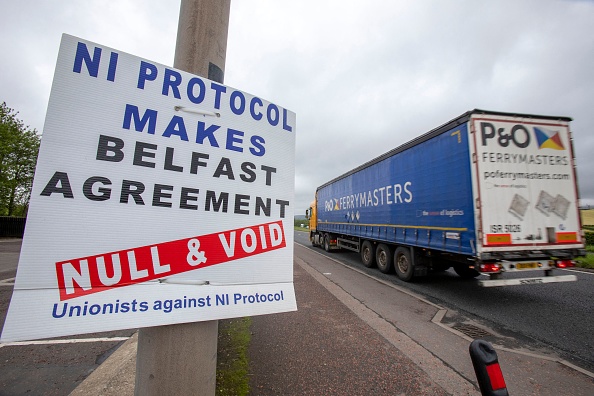Minister: UK ready to press ahead with unilateral change to NI Protocol

The UK is ready to push ahead with its move to unilaterally change the post-Brexit Northern Ireland Protocol, according to Northern Ireland minister Conor Burns.
Burns said the UK’s “simple” solution would be brought to parliament very soon, unless the EU can come up with a renewed political mandate for its negotiators.
Irish PM Micheál Martin today said the UK’s unilateral proposals, which the EU says would breach international law, would represent a “historic low point”.
Negotiations between London and Brussels over the protocol have been deadlocked for months, after both sides last year agreed there needed to be changes to reduce the number of checks on goods crossing the Irish Sea.
Northern Ireland still follows the EU’s customs union and single market rules, unlike the rest of the UK, in order to avoid a hard border with the Republic of Ireland.
Post-Brexit checks on goods going from Great Britain to Northern Ireland, enforced to protect the EU’s single market, have created economic and political disruption.
Foreign secretary Liz Truss has said she will bring forward legislation to create a dual track system, which would see checks only applied on goods that will be sold on to the EU after they have reached Northern Ireland.
The legislation could be introduced to parliament as early as next week.
Speaking to Westminster’s Northern Ireland Committee today, Conor Burns said: “The reality is if you’re going to sell into the single market you’d have to follow the rules, so this [dual regulatory regime] would only apply if those companies decided they didn’t want to do that.
“We’re essentially talking about how goods are treated as they move around these islands.”
The EU has complained that such a move would be in breach of international law and that a settlement must be agreed.
Irish PM Micheál Martin said: “It would quite literally be to the benefit of absolutely no one. Without a spirit of partnership there would have been no peace process in Northern Ireland.
“I just simply do not detect a sustained political will on behalf of the UK government to settle this, to resolve this, because it without question can be resolved.”